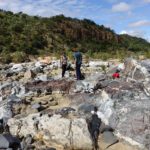Students will be offered a new undergraduate certificate or course specialisation specifically designed to combat the environment and climate emergency as part of a new Planet Positive program launched by Curtin University.
Ahead of World Environment Day on June 5, the new program includes options for an entry-point and stand-alone qualification, a supplementary qualification or complimentary coursework as part of a student’s degree.
The Planet Positive program, which launches this month, will be open to all Curtin undergraduate students, across the faculties of Health Sciences, Science and Engineering, Business and Law and Humanities.
Program academic champion Professor Josh Byrne, Curtin’s Faculty of Humanities Dean of Sustainable Futures, said the sector-leading program would position Curtin students to be better educated, prepared and qualified to help address the urgent challenges of climate change, waste generation, pollution and biodiversity loss.
“The Planet Positive program will equip students from all course backgrounds with the knowledge and skills to champion positive environmental change. It resets the paradigm from simply reducing the impact to being restorative and to being planet positive,” Professor Byrne said.
“This program responds to a call from the generation who will need to deal with climate change and other critical environmental challenges. They need to be equipped to tackle this and while we can mentor and support them, it is ultimately the students’ desire to learn and take ownership of the problems and solutions that will make a difference.”
Three student champions have been selected to support the new program including Curtin Fine Arts student Chase Hayes, Curtin Commerce student Krishna Karthikeyan and Curtin Interior Architecture student Zoe Thomas.

Chase said their desire to take an active role in combatting climate change was forged as a five-year-old when they experienced their first hurricane and cemented during the catastrophic fury of Hurricane Harvey, a 500-year flood event in 2017.
“Too often, climate change is debated as some future possibility when for so many of us, it is already reality. I mourn the people we could protect if only we could set our priorities straight,” Chase said.
“As a university student, so much of the rhetoric is about preparing for careers, learning practical skills to apply for a future job, and using my time in university to make myself the most appealing job candidate when I enter the workforce. What had been missing was a fundamental consideration of how higher education can prepare students for the challenges we will continue to face as part of the climate crisis.
“Being involved in Planet Positive is an opportunity for me to apply my passion towards enacting real world change, and with each person investing their time and efforts to such a critical cause, I become more and more hopeful that the people I care about will not have suffered in vain.”
The Planet Positive program includes the undergraduate certificate, course specialisation, access to a wider learning community that offers networking and work experience opportunities, as well as scholarships.
This month, Curtin will also launch its new Sustainable Development Strategy: Towards 2030, which offers a coordinated and strategic roadmap for how the University will continue to address the United Nations’ 17 sustainable development goals including aligning these to the curriculum for students.
For more information about the Planet Positive program, visit here.



